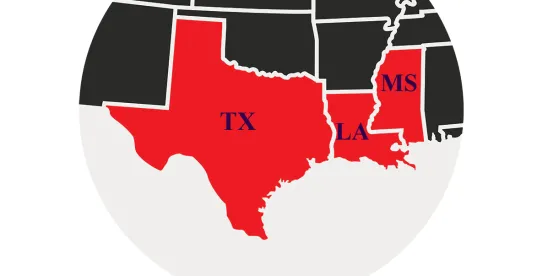A recent decision by the Fifth Circuit illustrates an important principle in insurance coverage disputes: The wording of insurance policies and basic grammar principles are important to coverage determinations, placing the onus on the insurers that draft insurance contracts to use clear and unambiguous language, especially in seeking to deny coverage based on exclusions. In Paloma Resources, L.L.C. v. Axis Ins. Co., No. 22-20228 (5th Cir. July 7, 2025), the insurance policy included an intellectual property exclusion, which used the phrase “actual or alleged” before listing a series of clauses. The court held that use of “the” immediately before the “misappropriation of ideas or trade secrets” clause in the exclusion meant that it was reasonable to interpret the exclusion as applying only to actual misappropriation, rather than broader actual and alleged misappropriation. Because the policyholder’s narrower reading of the exclusion based on the word “the” was reasonable, the court was required to adopt it, regardless of whether the insurer’s preferred, narrower interpretation was equally or even more reasonable.
Background
The policyholder’s business competitor alleged that an employee of the policyholder colluded with two of the competitor’s employees to steal and transfer confidential information of the competitor. The competitor also alleged that the policyholder induced the theft of the confidential information through the prospect of employment to the competitor’s employees.
After the competitor sued in Oklahoma state court, the parties settled with the policyholder stipulating that the lawsuit involved the unauthorized disclosure of and access to the competitor’s confidential information. The competitor also agreed to release the policyholder’s employee from liability arising out of the allegations in the lawsuit.
When the policyholder requested that the insurer cover defense costs and fund the settlement, the insurer denied coverage based on the policy’s IP exclusion, which barred coverage for any claims “based upon, arising out of, directly or indirectly resulting from, in consequence of, or in any way involving any actual or alleged infringement of copyright, patent, trademark, trade name, trade dress, or service mark or the misappropriation of ideas or trade secrets, or the unauthorized disclosure of or access to confidential information . . . .” The policyholder then sued the insurer and the competitor seeking a declaration that the insurer improperly denied coverage.
The insurer moved for summary judgment, arguing that it owed no defense or indemnity because the IP exclusion barred coverage based on any claim stemming from actual or alleged misappropriation. The district court adopted the insurer’s interpretation of the exclusion and granted the motion for summary judgment based on the IP exclusion.
The Fifth Circuit Decision
The policyholder appealed to the Fifth Circuit, which vacated the ruling that the insurer had no duty to defend or duty to indemnify the policyholder because of the IP exclusion.
On appeal, the policyholder argued that use of “the” immediately before the “misappropriation of ideas or trade secrets” clause in the IP exclusion meant that the phrase “actual or alleged” does not apply to the misappropriation clause. Meaning, the exclusion only applies to actual misappropriation of ideas or trade secrets, rather than alleged misappropriation.
The Fifth Circuit agreed with the policyholder based on interpretive canons and common grammar principles. The court first relied on the so-called “series-qualifier” canon, which applies modifying phrases to all of the nouns in the series unless the language or structure of the sentence indicates otherwise. Under this interpretive canon, the Fifth Circuit explained that the insurer’s placement of “the” before “misappropriation of ideas or trade secrets” suggests there was no carryover modification of “actual or alleged” to the second clause of the exclusion. In other words, the insurer’s inclusion of the determiner “the” before “misappropriation” represented a “purposeful break” in the syntax of the series so that “actual or alleged” did not apply to misappropriation. Therefore, the court concluded that it made no grammatical sense to read the IP exclusion as applying to “any actual or alleged . . . the misappropriation of trade secrets.”
The court next endorsed the interpretive principle that unclear or ambiguous policy language must be strictly construed against the insurer as the drafter pursuant to the principle of contra proferentem. This fundamental insurance principle holds that, if a policy term is open to multiple reasonable interpretations, the court must adopt the interpretation that supports coverage and favors the policyholder.
The Fifth Circuit further explained that, under Texas law, it was not required to assess whether the construction urged by the policyholder was the “most natural reading” or even whether it was more reasonable when compared to the construction offered by the insurer. Courts must adopt the policyholder’s construction of an exclusion as long as the construction is not unreasonable. It concluded that the construction offered by the policyholder was itself reasonable, and that was enough. The Fifth Circuit underscored that the policyholder’s argument that “actual or alleged” expressly modifies “infringement” was a reasonable one, so it vacated the district court’s ruling and remanded the case for further proceedings on whether the insurer had a duty to defend or a duty to indemnify the policyholder.
Key Takeaway
The Paloma Resources decision serves as a powerful reminder that ambiguities in exclusions must be resolved in the policyholder’s favor, which is the agreed-upon bargain with insurance, and that policyholders should not accept an insurer’s reading of a policy exclusion at face value when it is overbroad or confusing. Interpretive canons and grammar principles are an important tool in resolving such ambiguities. Policyholders contesting exclusionary language should be aware that they need not prove that they have a more reasonable interpretation than an insurer’s preferred interpretation. They simply must offer one reasonable interpretation, and the doors to coverage can swing back open.







 />i
/>i

